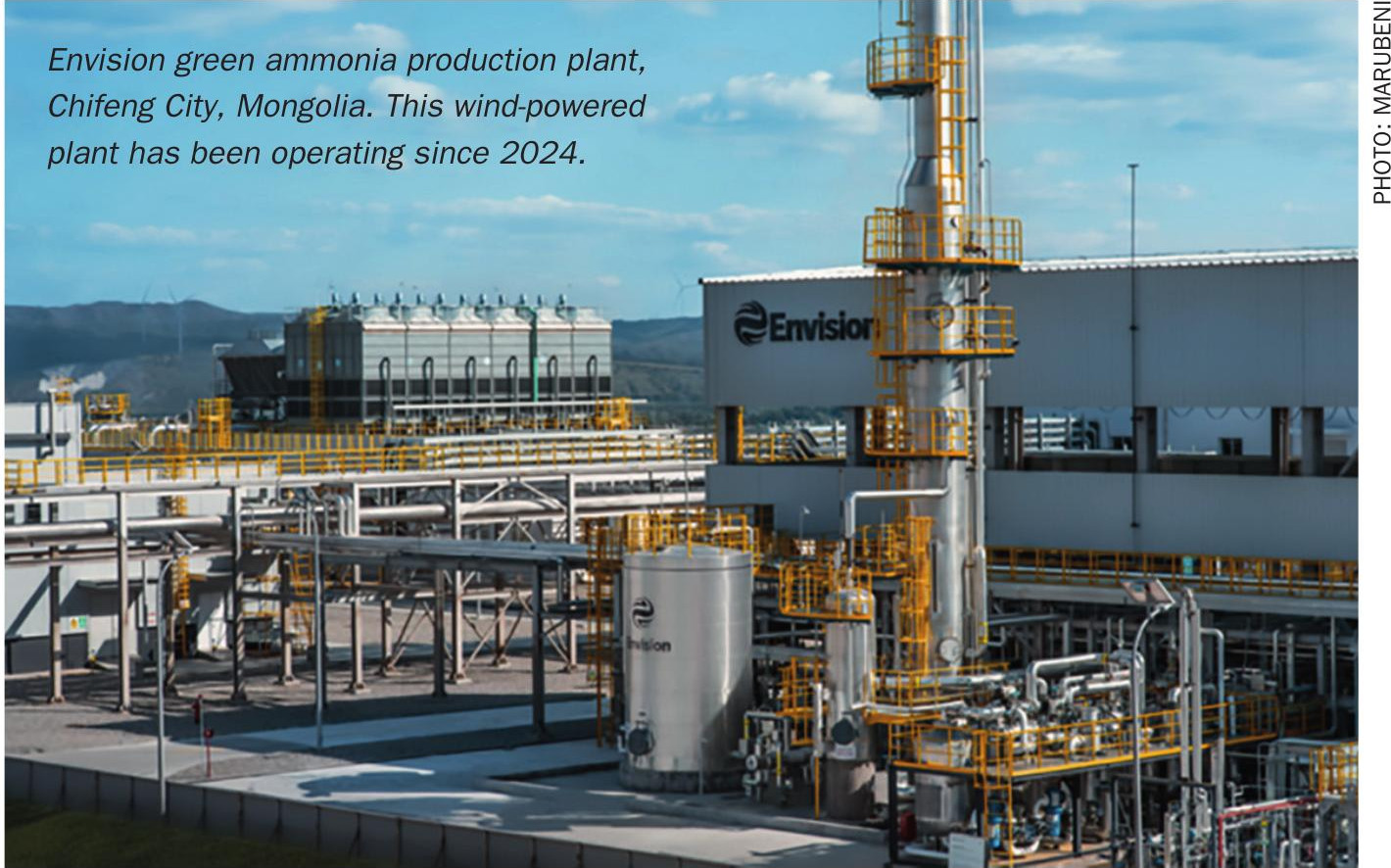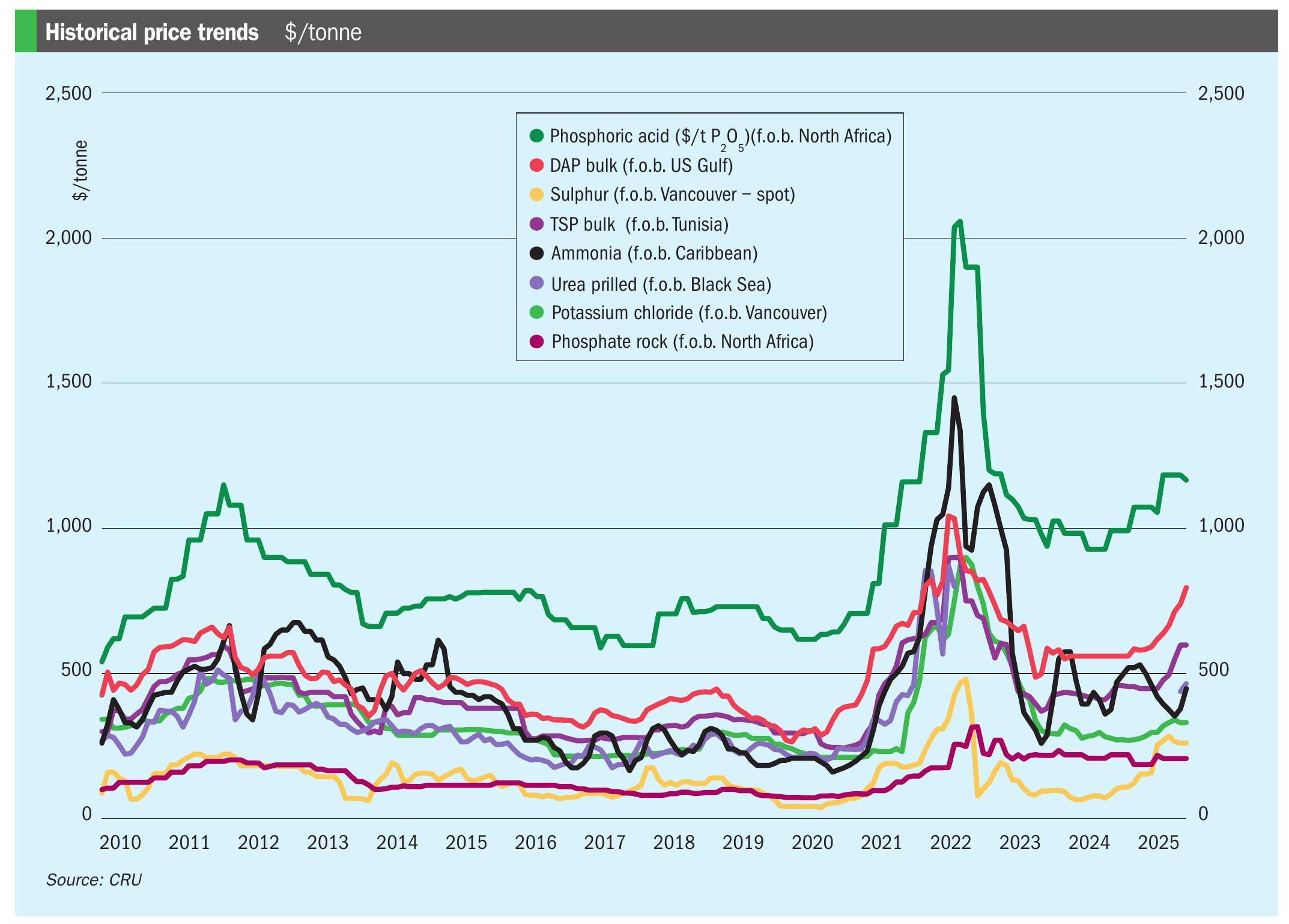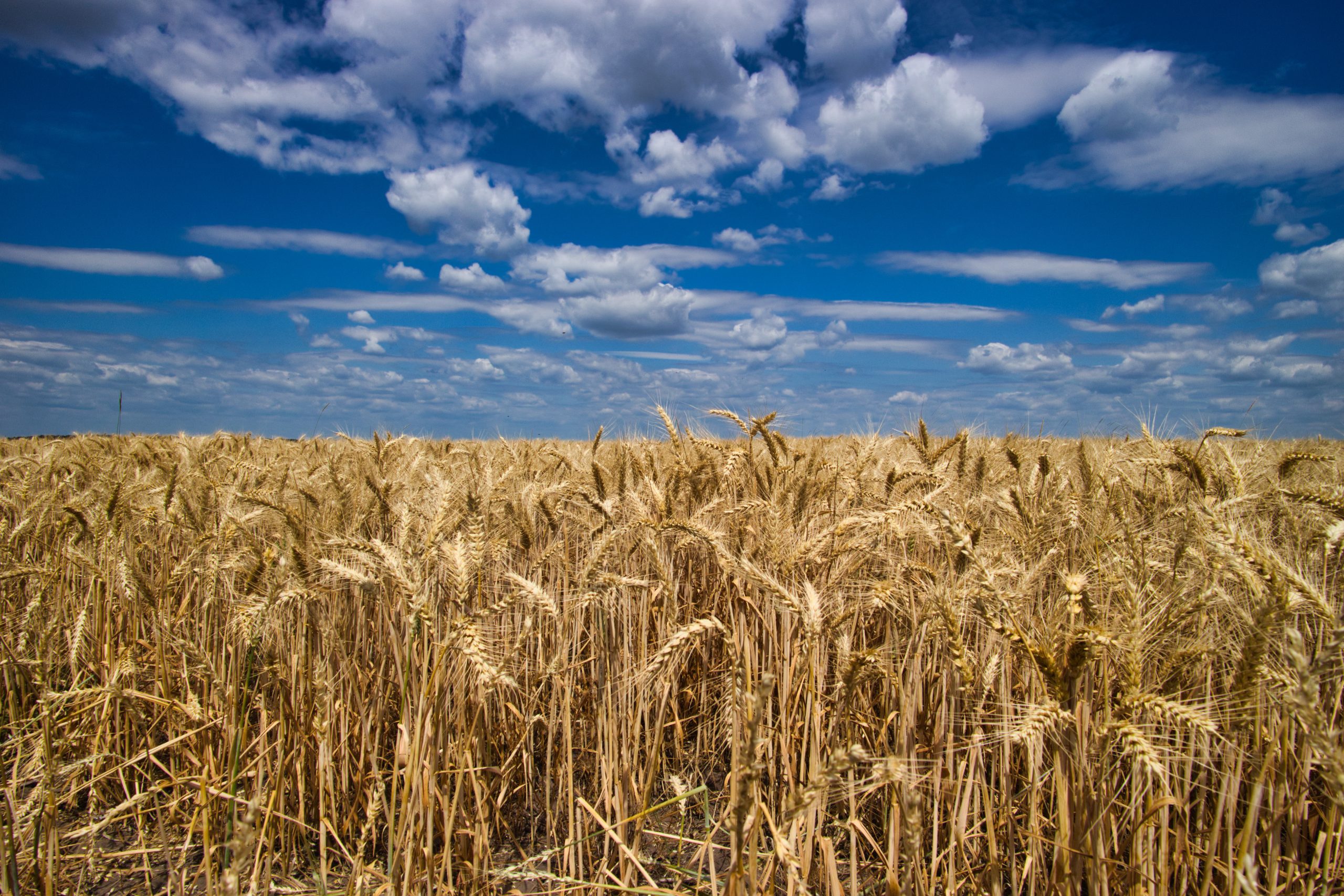Fertilizer International 497 Jul-Aug 2020
31 July 2020
Covid-19: adjusting to the new normal
COVID-19 PANDEMIC
Covid-19: adjusting to the new normal
We report on how the fertilizer industry and individual companies are working to mitigate the impacts of the Covid-19 pandemic.
Fertilizers declared an essential product
As the Covid-19 pandemic has continued to spread globally, draconian control measures have been introduced to limit contagion. Some countries have forced non-essential businesses to close – resulting in the cessation of commercial and industrial activities that are not deemed strategic or vital to the economy.
The overriding need to keep food supplies running and populations fed, however, has meant that agriculture and its supply chain have been exempted from such strictures. Indeed, a growing number of countries have now recognised the fertilizer industry, and the crop nutrient products it manufactures, as essential to the functioning of their economies.
The International Fertilizer Association (IFA) has drawn up a list of countries that have implemented measures designed to ensure that fertilizers continue to be supplied and distributed to farmers during the lockdown. This growing list includes: Argentina, Australia (New South Wales and Victoria), Belgium, Canada (Québec Province), China, Côte d’Ivoire, France, Ghana, India, Italy, Malaysia, Morocco, New Zealand, Nigeria, Pakistan, Russia, Spain, Swaziland, the United Kingdom, United States and Vietnam. Collectively, these nations account for about 60 percent of the global market for crop nutrients.
From this analysis, it is clear that the fertilizer industry has been largely protected from the immediate impacts of the Covid-19 pandemic, thanks to the intervention of national governments, and widespread recognition of the industry’s strategic role in supplying vital inputs for the production of food staples.
Behind the scenes, the industry has also made concerted efforts to maintain fertilizer production and keep distribution channels open, while safeguarding their employees at all times.
Below, we look at how the crop nutrients industry has reacted to a still unfolding and unprecedented global crisis. What is very noticeable is the extent to which fertilizer producers and their employees, while being focussed on ensuring operations continue, have also looked outwards and supported their local communities. Many companies have donated their time, expertise, personal protection equipment and, in some cases, millions of dollars to fighting Covid-19.
Information sharing holds the key
IFA was quick to react, establishing an online Covid-19 Information Centre during the pandemic’s early stages. The association judged that having access to accurate, up-to-date information on the global impacts of Covid-19 would be vital for the industry – and help ensure the continuation of production, supply and distribution of fertilizers internationally.
The centre provides relevant global market and supply chain news, regional and national policy developments, and updates on efforts by the UN and other multilateral agencies. It is also designed to allow IFA’s fertilizer industry members to exchange information on critical measures and share good practices and their learning experiences.
In launching the web-based portal, IFA commented: “During these challenging times, keeping each other informed and staying in touch is critical!”
In March, to gain a clearer picture of the scale of Covid-19 impacts in China, IFA carried out a survey of major international fertilizer producers with a presence in the country. The association also ran a webinar on Covid-19 – Best Practices and Lessons at the end of May. This covered China’s fight against Covid-19, plant management practices, and how to support employee stress at home and work. It included presentations from China’s CNAMPGC, Yara International and OCP Group.
Regional and national updates
Fertilizers Europe, the body that represents European Union fertilizer producers, began publishing weekly Covid-19 – implications for the EU fertilizer industry newsletters from 20th March. It has also been publishing a regular series of Media Reviews in parallel. Similarly, in the United States, The Fertilizer Institute has been publishing Covid-19 updates since 16th March.
Other regional bodies and national fertilizer trade associations have also been active in publishing updates on fertilizer production, supply and distribution, including:
- Germany’s Industrieverband Agra (IVA)
- Spain’s Asociación Nacional de Fabricantes de Fertilizantes (ANFFE)
- Italy’s Assofertilizzanti
- Belgium’s BELFertil
- The China Phosphate and Compound Fertilizer Industry Association and the China Nitrogen Fertilizer Industry Association.
In Africa, the IFDC has regularly published an East and Southern Africa Fertilizer Watch newsletter. Joint weekly West African trade updates have also been issued by IFDC, WAFA, and AfricaFertilizer.org.
The people and economies of Europe, particularly those of the UK, Italy and Spain, have been hit particularly hard by Covid-19 during the spring and summer. However, the fertilizer industry’s ‘essential’ status, drastic changes to working practices and cooperation between the sector and domestic governments have – in general – kept fertilizers rolling off production lines and ensured deliveries to farmers.
Italy was the first EU country to enter lockdown in early March. “The agri-food sector and all the activities linked to it – including fertilizers production and selling– were immediately recognised as fundamental and unstoppable, thanks to us,” commented Alice Parasecolo of Assofertilizzanti, Italy’s national association of fertilizer manufacturers, in April.
She continued: “[Under] restrictive measures adopted by the government at the end of March, fertilizers retailers and distributors were required to inform authorities about the continuation of their activities. However, due to the decline in the number of new cases and the severe economic consequences of the lockdown, some areas have started to work again [with] Italian fertilizer retailers and distributors re-opening after 14th April.”
Emerging from one of Europe’s strictest lockdowns, Spain’s Asociación Nacional de Fabricantes de Fertilizantes (ANFFE), is reporting a return to business as usual: “Nowadays, all fertilizer production, transportation and distribution activities are working correctly in Spain, and manufacturing companies are ensuring the supply of quality fertilizers to farmers, attending to any product request. At the same time, they are taking the necessary measures to protect the health and safety of workers, avoiding health risks.”
In an update in April, Sven Hartmann of German trade body Industrieverband Agra (IVA) said: “So far, measures [have] helped to keep production and logistics in Germany running. There is no shortage on agrochemicals for farmers. Up to now, food production in general and fertilization, specifically, have not been impaired.”
The Netherlands, a European production and distribution hub for fertilizers, has also reported minimal fertilizer industry disruption.
“The chemical industry (including mineral fertilizers production) as well as the agricultural sector is seen as a vital sector already from the start of the Covid-19 crisis. Up to now, signals we get from our members are that both production and distribution is continuing rather uninterrupted,” Reinier Gerrits, director of Meststoffen Nederland, the Dutch association of fertilizers manufacturers, importers and distributors, said in April.
He added: “Logistics is one of the main areas of concern, mostly regarding importing raw materials and shipping final products, but also for people living in Flanders and working in the Netherlands. Up to now fitting solutions have been implemented.”
In mid-May, Belgium’s BELFertil reported that: “Covid-19 did not really influence the operational activities of most of the members of BELFertil, the Belgian mineral fertilizers industry. The agro-food chain is considered to be a primary and essential sector in Belgium. This includes the mineral fertilizer industry.
The declaration of the industry as an essential sector, flexible logistics, and Belgium’s large-scale and fully operational ports, help explain the limited effects of Covid-19 so far, BELFertil suggests:
“The pandemic has a limited impact on the produced and delivered volumes of mineral fertilizers of our members. The installations were running on normal capacities. The resources kept coming in and the end products were going out almost like normal.”
Behind the scenes, this has required impressive organisational efforts to achieve, as BELFertil makes clear. Planned investments and recruitments have not stopped either, despite the uncertain situation. The main goal initially was to keep on-site staff levels as low as possible:
“The necessary measures were taken to enable safe working with day and night shifts working on minimum staffing. Technical operations were rescheduled, contractors were sent home, and administrative staff and salespeople have been working from home most of the time.”
The lifting of the lockdown has, however, allowed fertilizer industry employees in Belgium to begin returning to production sites and offices since the 11th May.
Following the imposition of the UK lockdown at the end of March, Sam Bell, commercial director of CF Fertilisers UK Ltd, the UK’s largest fertilizer manufacturer, confirmed that the British Government had granted the company ‘critical business status’. In an open letter to staff, Mr Bell said:
“We have re-organised our working patterns to protect against the pandemic and remain operational. As such we are able to keep producing to our normal product range and timescales.
“Safety is our number one priority. So, we are, and will, do everything we can to keep our plants working safely and to this aim our staff are either working from home or on the plants as required.”
“Much of our business involves putting the supply jigsaw together with our partners, from inputs to manufacturing, through production to sales and distribution. We are working with all our partners to ensure that this keeps going and that customers get what they require from us in a safe and timely manner.”
Safety, mitigation and business planning
A number of major fertilizer manufacturers have shared the actions they have taken to ensure that production has continued to operate as normal and their staff have remained safe during the Covid-19 pandemic.
Yara International, via IFA’s Covid-19 Information Centre, made available its internal guidance materials for other companies to use or adapt, including support and advice for:
- Home office stress
- Managing stress at work
- Checklist for operations.
The operational checklist – a risk mitigation document aimed at site and asset managers – is split into three sections covering: people and leadership; workplace organisation; physical assets, transport and security.
Moroccan phosphate giant OCP Group says that its production is proceeding as normal thanks to the implementation of business continuity planning (BCP) at each of its production sites. The aims of BCP are to safeguard the health and safety of employees, both on-site and those working from home, guarantee the provision of safety equipment, and maintain normal operating rates at OCP’s productions sites.
The BCP activities introduced by OCP have included:
- Remote control of production units
- A local crisis unit
- Prevention, response and communication plans
- A list of critical activities, an alert scheme and an assistance protocol
- The use of digital communication tools instead of physical meetings.
In a statement, the company said: “As a global business with more than 21,000 employees in more than 30 countries, our first response to the Covid-19 pandemic has been to ensure the safety and wellbeing of our team, our supplier partners, and the communities in which we operate. Our business resilience task force has led the transformation of our working practices, championing safety and spearheading the move to working from home for as many of our office workers as possible.”
As part of a comprehensive Mitigation & Escalation Action Plan issued towards the end of March, Bahrain-based Gulf Petrochemical Industries Company (GPIC) confirmed it had taken the following actions on operational management:
- Set up a coordination team to review the site continuity plan in the event of a pandemic
- Identified the minimum staff requirement to cover critical operations
- Identified critical positions to maintain on site
- Prepared a implementation plan for alternative shift coverage, if needed
- Developed integrated production slowdown and shutdown plans
- Conducted site-wide drill plans for production slowdown and shutdown
- Prepared housing facilities for shift workers
- Reviewed all Capex and projects currently under implementation
- Suspended external and internal audits
- Put non-critical activities on standby, including non-critical preventive maintenance
- Initiated a marketing contingency plan
- Coordinated with the authorities on the granting of special security passes to enable employees to commute to work if Bahrain declares a partial curfew.
Other ‘actions in progress’ include:
- Re-evaluation of the November 2020 turnaround date with the option to postpone this to March 2021
- Revision of planned factory acceptance test (FAT) visits outside Bahrain and the delegation of these to third parties, if necessary
- A follow-up marketing evaluation of product demand and net backs.
Emergency relief efforts
Fertilizer producers across the globe have pledged funds to support local communities facing hardship during the current crisis.
OCP Group has been particularly generous, donating $310 million to Morocco’s Covid-19 management and response fund. The company is also:
- Using 3D printing to design and produce personal protection equipment (PPE) for hospital staff
- Developing a Covid-19 track & trace app
- Producing its own hand sanitiser gel
- Donating an ambulance
- Refurbishing three regional public hospitals
- Providing resuscitation equipment and respirators
- Disinfecting public places and transport
- Caring for homeless people
- Raising awareness of hygiene measures among farmers.
“It is wonderful to see our teams making a positive impact in our society through Act4Community (OCP’s community engagement association), the OCP Foundation, the Phosboucraa Foundation and our other social programs to address the needs of their communities,” OCP said in a statement.
Impressively, in response to the pandemic, Yara International has committed $25 million to provide food for more than one million people in Southern and Eastern Africa. The Norwegian company has launched Action Africa: Thriving Farms, Thriving Future – an initiative designed to secure food production and improve food security for 250,000 smallholder farmers in seven African countries. Some 40,000 tonnes of high-quality, zinc-fortified fertilizers will be provided as part of this. Yara’s fertilizer contribution, combined with agronomic support, is expected to triple maize production and feed more than one million people across Kenya, Uganda, Rwanda, Tanzania, Zambia, Malawi and Mozambique for one year.
“Vulnerable communities may face the most devastating food crisis in decades. If we don’t act now, millions of people will be pushed into deep poverty and hunger. This is especially worrying in Africa where lives and livelihoods are at risk. As a critical part of the food value chain, we have a responsibility to support vulnerable farming communities and help avert a hunger crisis,” said Svein Tore Holsether, Yara’s president and CEO.
The Indian Farmers Fertiliser Cooperative Limited (IFFCO) has donated $3.4 million to the national PM-CARES Fund and $140,000 to the Punjab chief minister’s relief fund. IFFCO employees have also given one day’s pay towards relief efforts for the disadvantaged. The company is also manufacturing hand sanitisers, distributing coronavirus prevention kits to farmers and key workers, giving food to the disadvantaged, and providing Covid-19 prevention awareness to agricultural labourers.
Commenting on the contributions made by IFFCO – and those from Krishak Bharati Cooperative Limited (KRIBHCO) and National Fertilizers Limited – D V Sadananda Gowda, India’s fertilizer and chemicals minister said it will go a long way in helping the government combat coronavirus and mitigate the impacts of the outbreak.
In Pakistan, Fauji Fertilizer Company (FFC) has pledged $100,000 to community-support initiatives. The company has so far distributed 1,000 ration packs to disadvantaged families. It has also created a 60-bed public quarantine centre at FFC’s welfare complex, briefed farmers on Covid-19 safety measures, and launched a mass awareness campaign that includes the provision of hand sanitisers.
Florida-based Mosaic has confirmed the donation of $1.5 million to projects in Brazil, Canada, China, India and the US. The money will go towards food banks, government emergency funds, and the procurement and distribution of hygiene kits, medical kits and PPE.
Canadian fertilizer giant Nutrien has allocated $1 million in food support to local communities. The company’s Covid19 community support plan also offers volunteer support and virtual youth education, as well as providing in-kind donations such as N-95 face masks, Tyvek suits, computers and the manufacture of hand sanitisers for healthcare providers.
Illinois-based CF Industries has donated $350,000 to Feeding America and nine food banks located near its US manufacturing sites. The company has also donated large quantities of PPE to local hospitals and healthcare and nursing providers in both the US and the UK. These include P-100 masks, N-95 masks, gowns, shoe covers and eye goggles.
In Indonesia, PT Pusri Palembang has donated PPE, hygiene kits, medical kits and vitamins to the South Sumatran government, and was designated as the coordinator of the regional disaster task force. The company is also distributing medical kits to its local hospital, hygiene kits and PPE to the local community, and food to people in need.
Also in Indonesia, Pupuk Kaltim has provided PPE, extra food and disinfection help to three hospitals in East Kalimantan. It has also upgraded its company hospital, purchasing four ventilators and allocating 50 percent of hospital capacity to Covid19 patients, as well as providing isolation facilities and PPE.
The company was singled out for praise by the governor of East Kalimantan. “Pupuk Kaltim provides PPE assistance, extra food and vitamins to hospitals in Samarinda, Balikpapan and Bontang. They have supported health workers to treat patients with Covid-19,” the governor said during a Covid19 video conference call with Indonesia’s president Joko Widodo.






